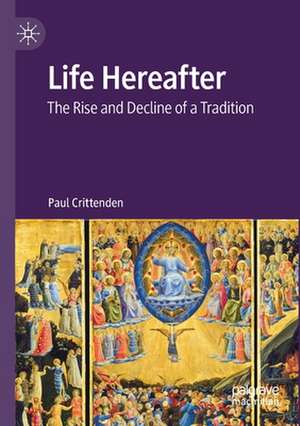Life Hereafter: The Rise and Decline of a Tradition
Autor Paul Crittendenen Limba Engleză Paperback – 26 oct 2021
| Toate formatele și edițiile | Preț | Express |
|---|---|---|
| Paperback (1) | 640.24 lei 6-8 săpt. | |
| Springer International Publishing – 26 oct 2021 | 640.24 lei 6-8 săpt. | |
| Hardback (1) | 644.30 lei 6-8 săpt. | |
| Springer International Publishing – 25 oct 2020 | 644.30 lei 6-8 săpt. |
Preț: 640.24 lei
Preț vechi: 753.22 lei
-15% Nou
Puncte Express: 960
Preț estimativ în valută:
122.51€ • 128.25$ • 101.37£
122.51€ • 128.25$ • 101.37£
Carte tipărită la comandă
Livrare economică 05-19 aprilie
Preluare comenzi: 021 569.72.76
Specificații
ISBN-13: 9783030542818
ISBN-10: 3030542815
Pagini: 307
Ilustrații: VIII, 307 p.
Dimensiuni: 148 x 210 mm
Greutate: 0.41 kg
Ediția:1st ed. 2021
Editura: Springer International Publishing
Colecția Palgrave Macmillan
Locul publicării:Cham, Switzerland
ISBN-10: 3030542815
Pagini: 307
Ilustrații: VIII, 307 p.
Dimensiuni: 148 x 210 mm
Greutate: 0.41 kg
Ediția:1st ed. 2021
Editura: Springer International Publishing
Colecția Palgrave Macmillan
Locul publicării:Cham, Switzerland
Cuprins
1 From Beginning to End.- 2 God in Biblical and Earl Christian Belief Creation and Covenants From the Patriarchs of Israel to the Fathers of the Church.- 3 From Sheol to the Resurrection of the Dead The Afterlife: From Genesis to the Book of Wisdom The Kingdom of Light and the Powers of Darkness: The New Testament The Invention of Satan and his Kingdom of Darkness: Judaic Sources The Day of the Lord in the New Testament and Early Christianity.- 4 From Homer to Plato and Aristotle The Poets: Homer and Hesiod The Presocratic Philosophers Plato: The Immortality of the Soul Aristotle: The Soul as Form of the Body.- 5 Salvation or Damnation: From Paul to Augustine Irenaeus of Lyons: God’s Plan for the Fulness of Time Origen: Restoration as Universal Salvation Augustine: From Freedom of the Will to Human Bondage ‘The Crabbed Crusader of Predestination’ The Pelagian Controversy: Original Sin, Free Will, Grace, Virtue and Vice The Afterlife of Pelagianism.- 6 Thomas Aquinas: Body and Soul From Augustine to Thomas Aquinas Platonism versus Aristotelianism: The Soul as Subsistent? The Soul as Immortal? The Creation of the Soul? The Mind (Soul) as Form of the Body Body and Soul after Aquinas.- 7 Thomas Aquinas: Life in the World to Come The Mental Powers of the Separated Soul The Afterlife of the Soul in Medieval Theology Salvation: Heaven, Hell, Angels and Demons A New Heaven and Earth, Resurrection, Judgment, The Joy of the Blessed The Punishment of the Damned, Divine Justice and Mercy The Will to Punishment Purgatory and Indulgences.- 8 Eschatology: From Dante to Ethics and Religion in a Secular Age The Reformation Era: Disputed Authority Religion, Ethics and Human Fulfilment in the Modern World.- 9. Eschatology Now: the Catholic Case Eschatology since the Second Vatican Council A Theologian’s View: Joseph Ratzinger Resurrection in Death: Gisbert Greshake Magisterial Intervention: Current Questions in Eschatology Recent Papal Pronouncements Eternal Punishment.- 10 Last Things Biblical Testimony Philosophical Queries Faith and the Limits of Knowledge: Kierkegaard and Socrates.- Bibliography.
Notă biografică
Paul Crittenden is Emeritus Professor of Philosophy at the University of Sydney, Australia. He is the author of Learning to Be Moral (1990), Changing Orders (2008), Sartre in Search of an Ethics (2009), and Reason, Will and Emotion (2012).
Textul de pe ultima copertă
In this book, Paul Crittenden offers a critical guide to the problematic origins of biblical teaching about the afterlife and the way in which it was subsequently developed by Church authorities and theologians—Origen, Augustine, and Thomas Aquinas in particular. In the post–Reformation era the focus falls on the challenges set by modern secularism. The tradition encompasses a body of interconnected themes: an apocalyptic war in which the Kingdom of God triumphs over Satan’s powers of darkness; salvation in Christ; the immortality of the soul; and finally the resurrection of the dead and the last judgment, ratifying an afterlife of eternal bliss for the morally good and punishment in hell for wrongdoers. The critique questions these beliefs on evidential, ethical, and philosophical grounds. The argument overall is that what lies beyond death is beyond knowledge. The one fundamental truth that can be distilled from the once compelling body of Christian eschatological belief—for believers and unbelievers alike—is the importance of living ethically.
Caracteristici
Provides a comprehensive critical study of the problematic origins and character of the Christian belief in the resurrection of the dead, the immortality of the soul, and the prospect of reward and punishment in the afterlife Explores the significant role of Greek philosophy in Christian thinking about human nature and the relation of body and soul Uses an interdisciplinary approach
